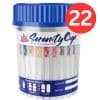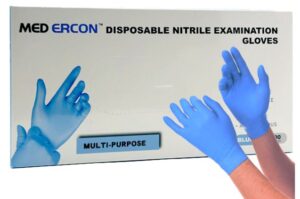Table of Contents
If you have ever undergone a drug test, you may be familiar with the term “false-positive.” A false-positive result indicates that the test has detected the presence of a drug in your system when, in reality, you have not taken it. False positive for MDMA can happen for several reasons, including the use of certain medications, foods, and other substances. In the case of MDMA, false-positive results can be caused by various medications and supplements.
Drug testing for MDMA is necessary for early detection because of the potential for its abuse. The adverse effects it poses resulting from chronic use have not well established. Still, many health professionals believe that long-term use can cause permanent neurological and health problems. The question is – what can cause a false positive for MDMA drug test?
What is MDMA?
MDMA, short for 3,4-methylenedioxymethamphetamine, is a synthetic drug that acts as both a stimulant and a hallucinogen [1]. It belongs to the amphetamine class of drugs and is known for its mind-altering properties. MDMA is commonly referred to as “ecstasy” when found in tablet form and “molly” when sold as a powder or capsules. It is important to note that ecstasy tablets often contain other substances that can be harmful, while molly may not contain any MDMA at all [2].
The Recreational Use of MDMA
MDMA is primarily used recreationally for its euphoric and empathogenic effects. Users often experience heightened sensations, increased sociability, and emotional openness [1]. The drug’s popularity is due to its ability to induce a sense of connection and well-being, making it a sought-after substance in party and festival settings.
Effects of MDMA on the Body and Mind
Upon ingestion, MDMA increases the release of serotonin, dopamine, and norepinephrine in the brain [1]. This surge in neurotransmitters leads to feelings of happiness, empathy, and increased energy. MDMA’s effects typically peak within 15 to 30 minutes and can last for about three hours [2]. It is important to note that the subjective experience of MDMA can vary from person to person.
How widely-used is MDMA?
MDMA first gained popularity as a party drug. Its use has spread to a broader range of settings over the years. Abuse of this drug has become a common problem in workplaces, schools, and athletic organizations. In some companies and private corporations, the purpose of regular drug testing. May result to lower employees’ insurance costs, increase productivity, minimize absenteeism and create a safe environment for work.
In the United States, a national survey conducted on Drug Use and Health show that more than 18 million people in their lifetime have tried MDMA at least once.
A survey from 2009 to 2019 conducted among an estimated 70,000 participants ranging from 12 years old above, the statistics show that approximately 2.54 million people had used MDMA in 2019.
In schools, statistics in the US show that trends in the prevalence of MDMA for 8th graders had a slight 0.2 percent increase from 2017 to 2020. Conversely, a decrease of 0.2 percent and 1.3 percent among 10th and 12th graders, respectively, from the same period, has noted.
What can cause a false positive for MDMA drug test?
It is essential to understand that false-positive results are not exclusive to MDMA drug tests. Many medications and supplements can cause false positives for various drugs, including MDMA. False positives for MDMA can be caused by certain prescription and over-the-counter medications. These include antidepressants such as bupropion, certain antipsychotic drugs, and ADHD medications like atomoxetine. Therefore, if you are taking any of these medications, you should discuss this with your healthcare provider before undergoing a drug test.
Several reported drug testing cases for MDMA on patients taking medications have tested positive for the substance but have not taken it, which leads to a false-positive result. Here are several common over-the-counter and prescription drugs that can cause this result for Molly or ecstasy.
Trazodone
Trazodone is a drug classified as an antidepressant. It used in patients with anxiety disorder, major depression, and, in conjunction with other medicines, alcohol dependence. It acts by restoring the balance of the brain chemical Serotonin. Dosages of 3 μg/mL(m-CPP) have resulted in a false positive for MDMA.
Mebeverine
Mebeverine is a drug used to treat acute symptoms of irritable bowel syndrome or IBS, which is a condition that causes an intestinal spasm. It acts by causing the muscles of the intestine to relax and also relieves bloating. At dosages of 405 milligrams, false positive urine drug screens for MDMA have reported while on this medication.
Metoprolol
Metoprolol is used to treat high blood pressure, chest pain due to lack of blood flow to the heart, and conditions that cause abnormal rapid heart rate. In some rare cases, this drug has reported to show a positive result for MDMA tests at low concentrations ( 150 μg/mL ).
Fenofibric acid
Fenofibric acid is a medication used to treat abnormal blood lipid levels. It works by decreasing levels of bad cholesterol( LDL or low-density lipoprotein ), total cholesterol, and triglycerides while increasing good cholesterol ( HDL or high-density lipoprotein ). Several false-positive ecstasy screening tests resulted from a single dose of 267 milligrams while on this antihyperlipidemic drug.
It is necessary to inform your healthcare provider if you are taking any of these medications when undergoing any drug test.
How to Prevent False Positive for MDMA Drug Tests?
If you are taking any medications or supplements that can cause a false positive for MDMA, it is essential to inform your healthcare provider or the testing agency beforehand. They may ask you to provide a list of all the medications and supplements you are taking, and in some cases, they may perform additional tests to confirm the results. If you are taking a prescription medication that contains amphetamines, you may need to provide a copy of your prescription or a letter from your healthcare provider to prove that you are taking it legally.
It is also essential to remember that false positives can be caused by other factors such as diet and environmental contaminants. Therefore, it is advisable to avoid certain foods and substances that may trigger a false positive, including poppy seeds, tonic water, and cold and allergy medications containing pseudoephedrine
Conclusion
In conclusion, false positive for MDMA drug tests due to various medications and substances that can produce similar metabolites. It is crucial to inform your healthcare provider or the testing agency if you are taking any medications or supplements that can interfere with the test.
If you or your organization needs to check for ecstasy, check out 12 Panel Now’s Dip cards, multi-panel cups, and MDMA drug test strips.




























